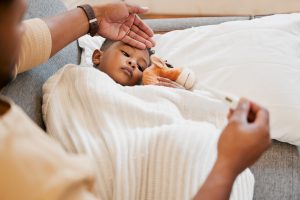 It’s common for infants to struggle with keeping food and liquids down as they eat, particularly during their first month of life. However, certain symptoms accompanying this vomiting may indicate a more serious underlying medical problem with your child, potentially requiring a visit to a pediatric specialist. Some of these conditions include:
It’s common for infants to struggle with keeping food and liquids down as they eat, particularly during their first month of life. However, certain symptoms accompanying this vomiting may indicate a more serious underlying medical problem with your child, potentially requiring a visit to a pediatric specialist. Some of these conditions include:
Gastroenteritis: Symptoms that may indicate gastroenteritis include mild diarrhea, irritability, stomach pain, and a poor appetite. This condition typically goes away on its own within a week, but if your baby starts to display symptoms such as dry skin, mouth, or eyes, a lack of tears, no wet diapers for up to 12 hours, or an unusual level of sleepiness or fatigue, they may be dehydrated and require an immediate visit to a pediatrician.
Ear infection: If your baby has an ear infection, it could cause nausea and vomiting without a fever. Some other symptoms they may experience include pain or discomfort in one or both ears, muffled hearing, and diarrhea. While an ear infection will usually resolve on its own without treatment, you should still take them to a pediatrician in case antibiotics are needed; severe infections could potentially damage a baby’s hearing.
Overheating: Hot weather and warm environments could overheat your baby, causing them to vomit and become dehydrated. In more serious cases, this can even lead to heat exhaustion or heatstroke. Make sure to get your baby into a cooler environment and hydrate them as soon as possible; if they continue to display symptoms such as pale skin, abnormal irritability, and fatigue, get them medical attention immediately.
Pyloric stenosis: This rare condition occurs when the pathway between the stomach and the intestines is too narrow, leading to excessive vomiting as well as dehydration, weight loss, constipation, and abnormally few wet diapers and bowel movements. Surgery is required to correct this condition; tell your pediatrician right away if you notice these symptoms.
Intussusception: This rare intestinal condition occurs when a baby’s intestine is damaged and slips into another part of the intestine. Aside from vomiting without a fever, a baby with intussusception may experience severe stomach cramps that cause them to curl their knees up to their chest, as well as fatigue, nausea, and blood or mucus in their bowel movements. Treatment for this condition involves pushing the intestine back into place.
If your child is experiencing symptoms of any of these conditions, they can receive specialized treatment at Forest Hills Pediatrics Specialists. To schedule an appointment, please call (718) 704-5020.
All content of this newsletter is intended for general information purposes only and is not intended or implied to be a substitute for professional medical advice, diagnosis or treatment. Please consult a medical professional before adopting any of the suggestions on this page. You must never disregard professional medical advice or delay seeking medical treatment based upon any content of this newsletter. PROMPTLY CONSULT YOUR PHYSICIAN OR CALL 911 IF YOU BELIEVE YOU HAVE A MEDICAL EMERGENCY.

